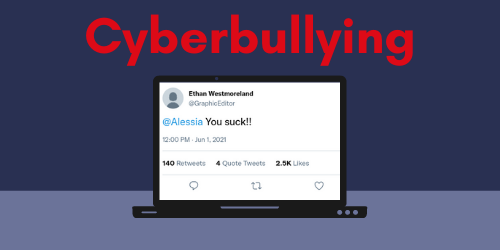A prominent cyberbullying epidemic is still prevalent in today’s society even after the constant attempts to bring awareness to the issue at hand through schooling and social media. The sentence “cyberbullying is not okay” is a well known catchphrase that students have heard ever since phones were available to them, but its significance remains true to this day. To put it as simply as possible, the pattern of cyberbullying is something that this generation must take control of and stop.
“It’s really easy to say something mean online in the heat of the moment, and that’s probably why it’s so dangerous,” an anonymous student said.
With no face-to-face contact, people are able to say whatever they want in an instant, creating an easy environment to ambush via social media platforms or instant messaging. This is also known as having a ”cyber alter ego.” This refers to the persona one has to try to fit in by bullying or being harmful to others without consequence online. A person’s attitude and ability to differentiate between appropriate and inappropriate behavior can change drastically between the real world to a “no rules no consequences” cyber dome.
For example, in person, the idea of seeing someone’s reaction or being malicious in a public setting helps most people recognize that saying something inappropriate may be harmful to others, whereas in an online setting, the real world aspect of harassment and bullying evaporates. In fact, statistics from Do Something–a youth for change organization–show that around 23% of people have admitted to doing something mean to another person online, and it only gets worse for women. The website also states that girls have an 8% higher chance of being cyberbullied than boys.
According to research done by the official US Stop Bullying Page, about 37% of young people between the ages of 12 and 17 have been bullied online, and 30% have had it happen more than once. This percentage is not made up of a far-away group of strangers. These are friends, family, partners and peers around the world that have been victims of a bully’s hatred.
The horror stories of what cyberbullying victims go through and the outcome of bullying are familiar ones to today’s children and teens, but cyberbullying seems to not be taken seriously enough in everyday life or outside the online community.
One way that people’s cyberbullying is often played down is by referring to it as “dark humor.” According to Google Dictionary, dark humor is “a style of comedy that makes light of subject matter that is generally considered taboo, particularly subjects that are normally considered serious or painful to discuss.” While dark humor may be acceptable as part of a movie or a fictional story, it is not an excuse for foul behavior towards real people in real life.
If you or any loved ones fall victim to cyberbullying, don’t be afraid to reach out. Hotlines include 1-800-842-8467 (VICTIMS) or 1-800-273-8255 (TALK). If you see anyone being cyberbullied, tell a trusted adult and be there for the victim. You never know what goes on in the life of others, and listening to someone could mean more to a victim than you may ever know.



